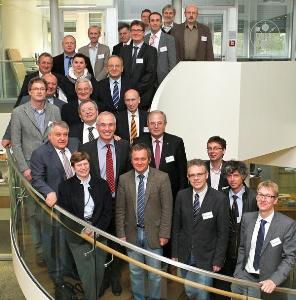Oct 11 2013
With a kick-off meeting at DESY in Hamburg the newly founded German-Russian Ioffe Röntgen Institute (IRI) has taken up work on Wednesday. The new institution will serve as an umbrella for cooperation in the development and application of large-scale research infrastructures.
 Participants of the IRI kick-off meeting
Participants of the IRI kick-off meeting
For the first IRI meeting around 30 participants from Germany and Russia came to DESY, including the Director of the Kurchatov Institute in Moscow, Prof. Mikhail Kovalchuk. The National Research Center Kurchatov Institute is the Russian IRI partner. On the German side Dr. Beatrix Vierkorn Rudolph, Head of the Directorate for Large Facilities and Basic Research of the Federal Ministry of Research (BMBF)and chair of DESY's Administrative Council, and the Chairman of the DESY Board of Directors, Professor Helmut Dosch, welcomed the guests .
At the constituent meeting a first funding round was decided that will be announced in mid-2014. Supported projects should be centered on research with synchrotron radiation and neutrons.
"With the IRI, we have created together with our Russian partners a framework with which we can effectively bring together German-Russian projects and initiatives, and give the German-Russian cooperation further impetus," said Dosch, who is also Vice- President of the Helmholtz Association for the research field Structure of Matter.
As early as 2007, an agreement concerning cooperation in the development and use of accelerator-based photon sources was concluded between Germany and Russia. Thematic emphasis included research with photons in the life sciences, material sciences and nanosciences, as well as development of light sources and related accelerator technology. In 2011, an additional letter of intent was signed at the ministerial level to strengthen scientific cooperation with the objective of supporting the construction of a new facility (the IRI) jointly backed by Germany and Russia, which is supposed to consolidate cooperative activities in the context of larger research infrastructures. The research centers of the Helmholtz Association are mentioned as partners on the German side and the National Research Center Kurchatov Institute on the Russian side. In February 2012, a basic agreement was finally signed between DESY and NRC Kurchatov Institute to set up the IRI.
The IRI is supposed to place cooperation between German and Russian scientists on a new structural basis over the long term and offer a common umbrella for future bilateral projects and initiatives in the field of large research infrastructures in order to further strengthen and deepen cooperation in this strategically important research area for both countries.